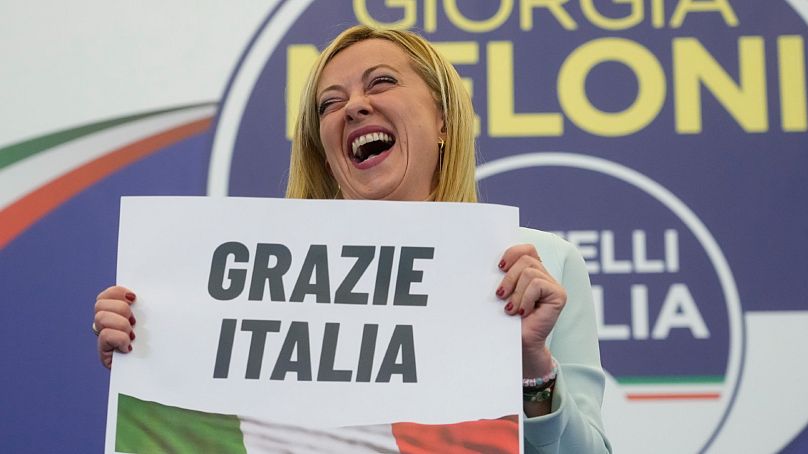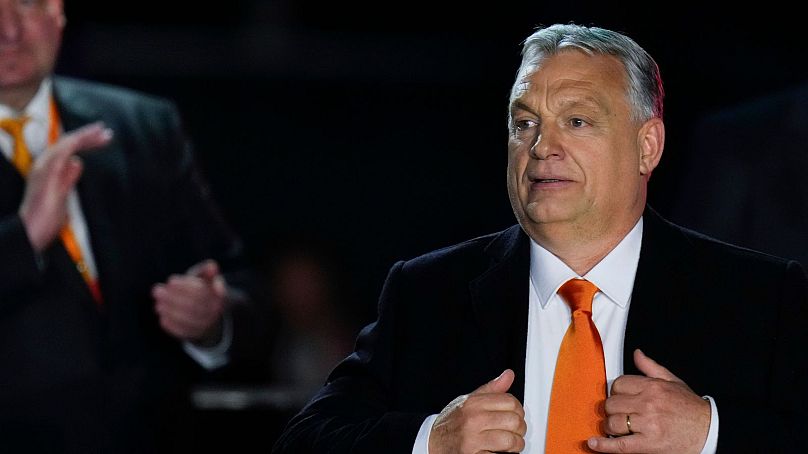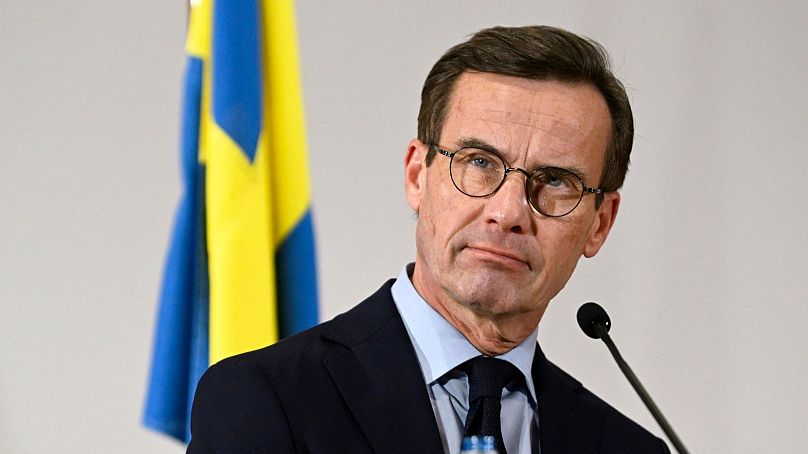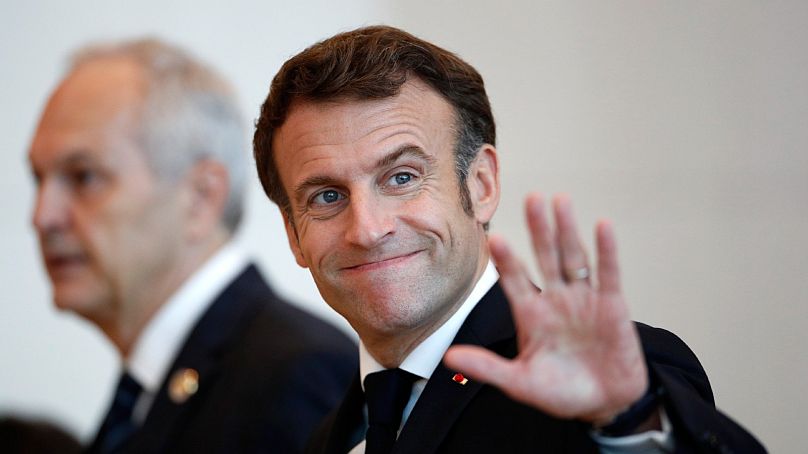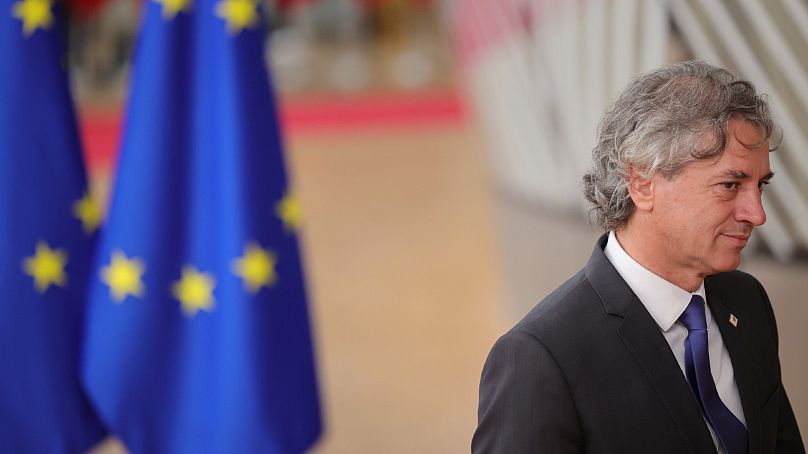A look at some of the elections that had wider European implications this year.
1. Italy gets first far-right leader since World War II
One of Europe's most high-profile elections this year was in Italy, where Giorgia Meloni became the country's first far-right leader since World War II.
Meloni's Brothers of Italy (Fratelli d'Italia) emerged as the biggest party after voters went to the polls in late September.
Her party was sworn into government as part of a right-wing coalition with Matteo Salvini's Northern League (Lega Nord) and Silvio Berlusconi's Let's Go Italy (Forza Italia), sparking fears of Euroscepticism in one of the European Union's founding members.
"People thought that Giorgia Meloni would pick a fight with Europe but she has done the opposite," Daniele Albertazzi, professor of politics at the University of Surrey, reviewing Meloni's first months in power.
"Italy is economically reliant on the European Recovery Fund, which is also why Meloni cannot afford to pick fights on the scale that Hungary and Poland have with the European Commission.
"She wants to come over as prime ministerial and conservative rather than extreme."
As well as turning away from picking a fight with Brussels, Meloni -- Italy's first female prime minister -- has also taken a pro-NATO stance and backed increased European defence spending to help Ukraine following Russia's invasion in February.
Coalition partners Salvini and Berlusconi have both praised Russian president Vladimir Putin in the past and it was feared Italy would be less supportive of Kyiv.
Domestically, Meloni has been able to take on more of a hardline stance. She made headlines in November when she refused to let the migrant rescue ship Ocean Viking dock in Italy.
Looking forward, Albertazzi says the coalition's honeymoon period may be short-lived.
"Matteo Salvini may decide to strike and regain support from his more hardline voters who have recently switched within the right to backing Meloni," he said. "His party backs regional autonomy and has organised referendums on the question. In practice, Meloni will struggle to deliver on these promises."
2. Hungary's Viktor Orban irks Brussels with a record-breaking fourth term
Viktor Orban secured a record-breaking fourth term as Hungary's prime minister after a landslide election victory in April.
His right-wing populist party Fidesz won more than two-thirds of parliamentary seats.
Orban did not campaign on a specific policy manifesto, instead using speeches and televised TV debates to engage with voters.
He also painted himself as the candidate who would keep Hungary from being drawn into the Ukraine war, then in its infancy.
His victory was a huge disappointment to the opposition -- who had united around one candidate to give them the best chance of ousting Orban -- and Brussels.
In his post-election comments, Orban boasted "we won a victory so big that you can see it from the moon, and you can certainly see it from Brussels".
That jab at the European Commission is part of a long-running feud with Budapest over whether Orban's Hungary adheres to EU values.
Zsuzsanna Vegh, an associate researcher at the European Council on Foreign Relations, told Euronews that since his reelection, "Viktor Orban’s confrontational and aggressive attitude towards European institutions has escalated".
It culminated in Brussels announcing in late November that it was freezing the transfer of €7.5 billion in EU recovery funds to Budapest because Hungarian reforms to address "rule of law" concerns were inadequate.
The European Commission later reduced the amount frozen to €5.8 billion in exchange for Budapest -- among other things -- lifting its veto on sending €18 billion in EU aid to Ukraine.
In late December, the European Commission declared it would withhold the totality of Hungarian EU cohesion funds for 2021-2027 - a figure amounting to €22 billion. The assets are frozen on top of the withheld EU recovery funds, until the required conditions related to judiciary independence, academic freedoms, LGBTQI rights and the asylum system are fulfilled.
3. Far-right is the biggest winner in Sweden's election
As in Italy, Sweden's election also saw a triumph for the far-right.
The Sweden Democrats, a party with its roots in fascism and Sweden's neo-Nazi movement during the 1990s, finished second in the vote, behind the Social Democrats.
That meant leader Jimmie Åkesson was able to play a very strong role in the formation of the new right-wing government, and although his party it not a formal member of that coalition of the Moderates, Christian Democrats and Liberals, it still has a big say in all policy decisions for Prime Minister Ulf Kristersson's government.
The Sweden Democrats now have considerable political leverage, explained Lucas Dahlström, Nordic correspondent at Yle, Finland's public broadcaster. The Sweden Democrats, he added, have used it to influence "migration policy as well as law and order reforms".
But Sweden's shift to the right is not a flash in the pan. Dahlström said since 2016 there had been a gradual movement in that direction, accelerated by a rise in crime.
A report last spring by the Swedish National Council for Crime Prevention claimed Sweden was among the European nations with the sharpest rise in gun violence.
Meanwhile, Dahsltröm said European integration "remains a strong policy for Sweden’s new government".
It comes amid concerns in Brussels about the Swedish Democrats' influence on Stockholm's presidency of the Council of the European Union from 1 January 2023.
4. Macron wins a second term as French president
Pro-European parties were handed a boost in April when France's president, Emmanuel Macron, secured a second term.
Macron again beat far-right challenger Marine Le Pen in the run-off vote.
However in France's legislative election, held two months later, Macron's Renaissance party lost its absolute majority in parliament.
Despite talks to form a coalition, Macron's party and its allies decided to form a minority government.
Since his re-election, Macron has continued to lobby for his controversial pension reform plan - which he failed to pass a vote on during his previous mandate.
He is pressing for the retirement age in France to be pushed up to either 64 or 65 years old. It currently stands at 62, which is one of the lowest levels in Europe. Macron will unveil his revised proposed pension plan on 10 January 2023.
In Europe, Macron continued to pursue his pro-European political agenda, spearheading the European Political Community, which brings together the European Union states and other countries, especially those seeking to join the 27-member bloc.
5. Newcomer ousts populist prime minister Janez Jansa in Slovenia
Populist prime minister Janez Jansa, a supporter of Donald Trump who was accused of taking Slovenia on a similar right-wing path to Hungary, was ousted after a surprise election result in April.
A new liberal party, the Freedom Movement, shocked observers by winning a 34.5% vote share, compared with 23.6% for Janša’s Slovenian Democratic Party.
Party founder and leader Robert Golob became Slovenia's new prime minister.
Throughout the election campaign, Golob framed the vote -- which saw the highest voter turnout since 2000 -- as “a referendum on democracy", accusing Janša of undermining democratic institutions and press freedoms since he took over in 2020.
He also promised to salvage his country's relationship with the EU, which has been badly damaged by Janša's overtures to the Hungarian nationalist leader Viktor Orban.
"This country has always been oriented towards Western Europe and I am convinced that we will return to our family," Golob told AFP during the campaign.
In July, three months after the vote, Slovenia became the first post-communist European country to legalise same-sex marriage, part of Golob’s socially progressive agenda.
Slovenia has also backed the expansion of the EU's free movement zone to include Croatia. Slovenia's decision to back this move is poignant given that the two countries have been involved in a three-decade long border dispute - which previously saw Slovenia block Croatia’s ascension into the EU.
Janša began his third term as Slovenia's prime minister in 2020. As well as facing accusations of sliding toward authoritarian rule in the style of Orban, he came under EU scrutiny amid reports that he pressured opponents and public media, launched attacks against journalists, and installed loyalists in key positions for control over state institutions.












